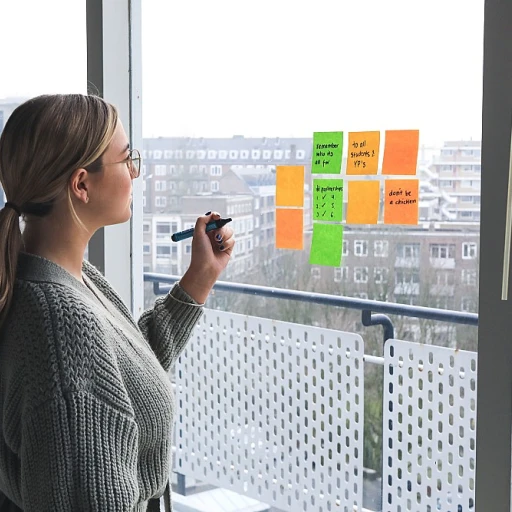
Understanding Employee Engagement
Grasping the Concept of Engagement at Work
Understanding what truly fuels employee engagement is a critical step toward fostering a vibrant workplace culture. In essence, engagement is the emotional connection and commitment employees have towards their job and the company. This can manifest in various ways, from going the extra mile on a project to actively participating in team building activities. To boost morale, it's essential to create an environment that encourages employees to feel valued and recognized. Engagement is not just about individual performance but also how teams collaborate and function together within the office. Thus, it’s important for companies to develop a strategy that incorporates recognition, communication, and growth opportunities, while also fostering a sense of belonging among team members. Engaged employees are more likely to contribute ideas and participate in activities that lead to a more productive and effective workplace. They feel empowered to share innovative solutions and work cohesively within a group, enhancing overall company culture. This is why inexpensive employee engagement activities, such as celebrating small wins or encouraging peer recognition, can make a significant difference in boosting job satisfaction. Moreover, leveraging digital tools can help employees share feedback and provide insights on how to enhance their work environment. Ultimately, when employees feel their contributions are acknowledged and appreciated, it leads to a more engaged and motivated workforce, driving the company towards sustained success. For more insights on improving engagement through tailored HR strategies, you can explore further here.The Role of Communication
Enhancing Workplace Interaction
Effective communication is the cornerstone of any engaged team. Companies must prioritize open lines of interaction to ensure employees feel valued and heard. Introducing regular feedback sessions and team meeting opportunities can create an inclusive work environment where employees share their insights without hesitation.
Establishing a culture of transparency helps employees connect with their roles and the company mission more authentically. Encourage employees to express their ideas during team brainstorming activities. This not only boosts morale but also leads to innovative engagement ideas.
Moreover, incorporating effective communication strategies can encourage employees to actively partake in discussions, fostering a sense of unity and shared purpose. By allocating time for regular office ‘huddles’, the company demonstrates its commitment to listening to every voice within the workplace.
Team building activities, even if conducted virtually, can help employees feel more connected. Inexpensive employee engagement activities that incorporate fun and interaction pave the way for a more vibrant workplace culture. When peer recognition is part of everyday interactions, it builds a cohesive company culture where engagement flourishes.
Recognition and Appreciation
Peer Recognition as a Core Element
One of the most impactful avenues to enhance employee engagement is through meaningful recognition and appreciation. When team members feel valued for their contributions, it fosters a sense of belonging and commitment to their work. Companies that prioritize peer recognition cultivate a positive workplace culture where employees are more motivated and engaged.
To create an environment where recognition is a norm rather than an exception, it's crucial to implement systems that encourage employees to acknowledge each other’s efforts regularly. These can be inexpensive employee engagement activities that incorporate simple yet effective recognition methods. For instance, starting the day with a brief session where team members can share gratitude or achievements can build morale and foster teamwork. This simple practice can significantly boost employee satisfaction and create an atmosphere where everyone feels part of something bigger.
Simple Ideas to Boost Morale
Consider low-cost ideas such as setting up a "Kudos Board" in the office, where employees can post appreciation notes for their colleagues. Such activities not only make the workplace fun but also promote a culture of appreciation and transparency. Encouraging verbal recognition during team meetings can also help employees feel appreciated in real-time. Setting up these informal and spontaneous recognition opportunities helps reinforce the value placed on everyone's contributions.
Moreover, diversifying the ways to affirm efforts and achievements among employees can go a long way in building a culture of respect and support within your organization. This can be as simple as dedicating time each week for team-building activities that allow employees to bond outside of their usual work tasks. By prioritizing recognition, companies can positively impact job satisfaction and create a workplace where employees are not only engaged but also eager to contribute to the company's success.
For a deeper understanding of how recognition can be beneficial, crafting effective systems to assess and recognize employee achievements can be explored here.
Opportunities for Growth
Fostering Professional Development Opportunities
Creating opportunities for growth is essential in maintaining employee engagement, improving job satisfaction, and boosting morale. When employees perceive that a company invests time and resources into their professional development, they feel valued and are more likely to stay committed to the company's goals.
Here are some inexpensive employee engagement ideas that can be implemented to foster growth:
- Encourage Continuous Learning: Providing access to online courses, workshops, or seminars can greatly enhance skills. Investing in self-paced learning platforms is a cost-effective way for employees to advance their knowledge and bring new ideas into the office.
- Mentorship Programs: Pairing team members with mentors within the organization not only enhances career development but also strengthens company culture. This personal connection can help employees feel supported in their professional journeys, ultimately benefiting the entire team.
- Internal Team Building Activities: Hosting regular sessions where employees can share their experiences and skills with peers can foster a collaborative and engaged atmosphere. For instance, monthly 'lunch and learn' sessions can be an engaging way to encourage employees to share their insights and expertise while bonding over a meal.
- Promote Cross-Departmental Collaboration: Encouraging employees to participate in cross-departmental projects can broaden their skill sets and introduce them to different aspects of the company. This can be an exciting engagement activity that breaks monotony and encourages creativity.
All these activities contribute to creating a positive workplace culture where employees are recognized as valuable team members. By implementing these strategies, companies can help employees feel invested in, thus fostering a more engaged and productive workforce.
Creating a Positive Work Environment
Fostering Positive Work Environment
Creating a positive work environment is fundamental to enhancing employee engagement and fostering a workplace culture where team members feel valued. Below are some strategies and ideas to help employees feel more connected and satisfied in their roles:- Encourage Open Communication: Facilitate an atmosphere where employees feel comfortable sharing their thoughts and ideas. Encourage employees to voice their concerns and suggestions during team meetings. This helps in building trust and openness within the office.
- Promote Team Building Activities: Organize regular team building activities that are both fun and purposeful. These activities can boost employee morale and strengthen relationships. Consider inexpensive employee engagement activities that don't require a significant investment but deliver substantial benefits.
- Create a Sense of Belonging: Implement initiatives that reinforce peer recognition among employees. Celebrate achievements, big or small, and recognize employees in a way that makes them feel valued and appreciated. This recognition is key in building a cohesive team culture.
- Flexible Work Arrangements: Offering flexibility in work arrangements can significantly enhance job satisfaction. Whether it's remote work options or flexible hours, accommodating diverse needs can lead to a more engaged workforce.
- Comfortable Work Spaces: Ensure the physical workspace is comfortable and conducive to productivity. A well-set-up office with adequate resources can greatly affect employees' day-to-day experience, impacting their engagement levels.













